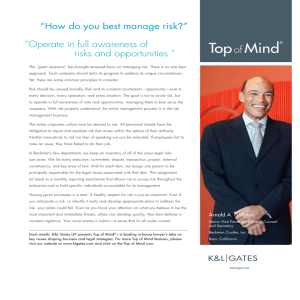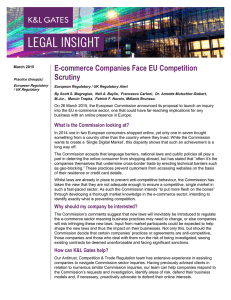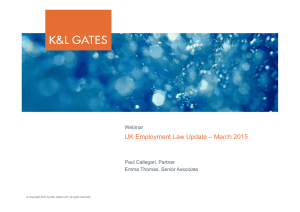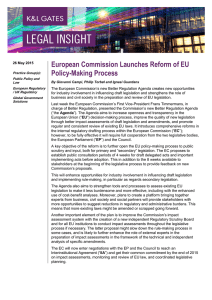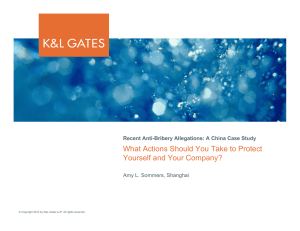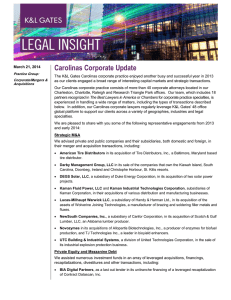“Who Decides” Whether Class Arbitration Is Chesapeake Appalachia, LLC v.
advertisement
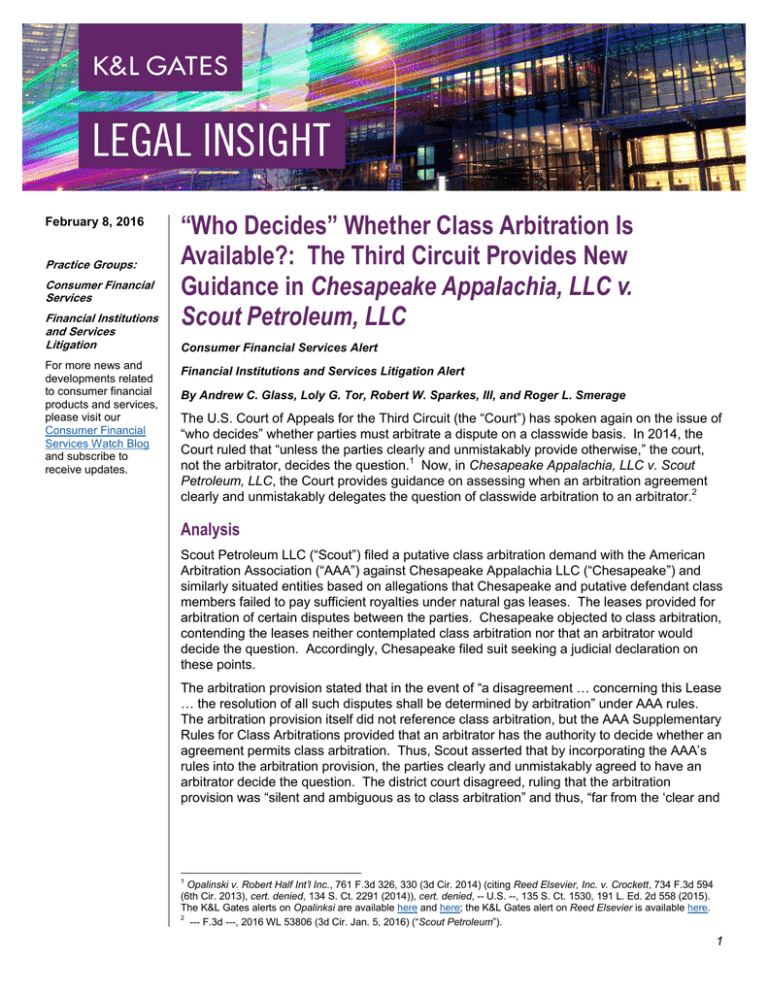
February 8, 2016 Practice Groups: Consumer Financial Services Financial Institutions and Services Litigation For more news and developments related to consumer financial products and services, please visit our Consumer Financial Services Watch Blog and subscribe to receive updates. “Who Decides” Whether Class Arbitration Is Available?: The Third Circuit Provides New Guidance in Chesapeake Appalachia, LLC v. Scout Petroleum, LLC Consumer Financial Services Alert Financial Institutions and Services Litigation Alert By Andrew C. Glass, Loly G. Tor, Robert W. Sparkes, III, and Roger L. Smerage The U.S. Court of Appeals for the Third Circuit (the “Court”) has spoken again on the issue of “who decides” whether parties must arbitrate a dispute on a classwide basis. In 2014, the Court ruled that “unless the parties clearly and unmistakably provide otherwise,” the court, not the arbitrator, decides the question.1 Now, in Chesapeake Appalachia, LLC v. Scout Petroleum, LLC, the Court provides guidance on assessing when an arbitration agreement clearly and unmistakably delegates the question of classwide arbitration to an arbitrator.2 Analysis Scout Petroleum LLC (“Scout”) filed a putative class arbitration demand with the American Arbitration Association (“AAA”) against Chesapeake Appalachia LLC (“Chesapeake”) and similarly situated entities based on allegations that Chesapeake and putative defendant class members failed to pay sufficient royalties under natural gas leases. The leases provided for arbitration of certain disputes between the parties. Chesapeake objected to class arbitration, contending the leases neither contemplated class arbitration nor that an arbitrator would decide the question. Accordingly, Chesapeake filed suit seeking a judicial declaration on these points. The arbitration provision stated that in the event of “a disagreement … concerning this Lease … the resolution of all such disputes shall be determined by arbitration” under AAA rules. The arbitration provision itself did not reference class arbitration, but the AAA Supplementary Rules for Class Arbitrations provided that an arbitrator has the authority to decide whether an agreement permits class arbitration. Thus, Scout asserted that by incorporating the AAA’s rules into the arbitration provision, the parties clearly and unmistakably agreed to have an arbitrator decide the question. The district court disagreed, ruling that the arbitration provision was “silent and ambiguous as to class arbitration” and thus, “far from the ‘clear and 1 Opalinski v. Robert Half Int’l Inc., 761 F.3d 326, 330 (3d Cir. 2014) (citing Reed Elsevier, Inc. v. Crockett, 734 F.3d 594 (6th Cir. 2013), cert. denied, 134 S. Ct. 2291 (2014)), cert. denied, -- U.S. --, 135 S. Ct. 1530, 191 L. Ed. 2d 558 (2015). The K&L Gates alerts on Opalinksi are available here and here; the K&L Gates alert on Reed Elsevier is available here. 2 --- F.3d ---, 2016 WL 53806 (3d Cir. Jan. 5, 2016) (“Scout Petroleum”). 1 Consumer Financial Services Practice Contact List unmistakable’ allowance needed for an arbitrator, and not a court” to determine whether class arbitration is permitted.3 The Court agreed with the district court, affirming that an arbitration provision that is silent on the issue of who decides the availability of class arbitration does not clearly and unmistakably delegate the question to an arbitrator. The Court explained that an agreement that fails to reference class arbitration and makes only a general reference to an arbitral body’s rules is insufficient to clearly delegate authority to an arbitrator to decide whether the parties agreed to class arbitration.4 In so holding, the Court distinguished jurisprudence finding that incorporation of AAA rules is sufficient to delegate to an arbitrator the question of whether a dispute is subject to bilateral arbitration. Rather, the Court ruled that classwide arbitration is significantly different from two-party arbitration.5 Consequently, the Court held that caselaw addressing bilateral arbitrations “is entitled to relatively little weight in the class arbitrability context,” because “the whole notion of class arbitration implicates a particular set of concerns that are absent in the bilateral context.”6 Conclusion The Scout Petroleum decision cements the notion in the Third Circuit that the availability of class arbitration is a gateway question reserved for a court to decide absent clear and unmistakable language delegating that authority to an arbitrator. Grounded in U.S. Supreme Court precedent that there are fundamental differences between bilateral and class arbitration, Scout Petroleum will likely be persuasive to other federal courts considering this question in the future. Authors: Andrew C. Glass andrew.glass@klgates.com +1.617.261.3107 Loly G. Tor loly.tor@klgates.com +1.973.848.4026 Robert W. Sparkes, III robert.sparkes@klgates.com +1.617.951.9134 3 Id. at *4 (summarizing lower court decision). In examining the same question regarding the same arbitration provision, a different judge in the same district court had reached the opposite conclusion, finding the arbitration provision satisfied the high burden in Opalinski by incorporating the AAA’s rules. See Chesapeake Appalachia, LLC v. Burkett, No. CIV. A. 3:133073, 2014 WL 5312829, at *8 (M.D. Pa. Oct. 17, 2014). The earlier district court decision is abrogated by Scout Petroleum. 4 2016 WL 53806, at *11. 5 Id. (“[T]he differences between bilateral and class-action arbitration are too great for arbitrators to presume … that the parties’ mere silence on the issue of class-action arbitration constitutes consent to resolve their disputes in class proceedings.”) (quoting Stolt–Nielsen S.A. v. AnimalFeeds Int’l Corp., 559 U.S. 662, 687 (2010)). 6 2016 WL 53806, at *15. 2 Consumer Financial Services Practice Contact List Roger L. Smerage roger.smerage@klgates.com +1.617.951.9070 3 Consumer Financial Services Practice Contact List K&L Gates’ Consumer Financial Services practice provides a comprehensive range of transactional, regulatory compliance, enforcement and litigation services to the lending and settlement service industry. Our focus includes first- and subordinate-lien, open- and closed-end residential mortgage loans, as well as multi-family and commercial mortgage loans. We also advise clients on direct and indirect automobile, and manufactured housing finance relationships. In addition, we handle unsecured consumer and commercial lending. In all areas, our practice includes traditional and e-commerce applications of current law governing the fields of mortgage banking and consumer finance. For more information, please contact one of the professionals listed below. LAWYERS Boston R. Bruce Allensworth Gregory N. Blase David E. Fialkow Brian M. Forbes Irene C. Freidel Andrew C. Glass Sean R. Higgins Sean P. Mahoney Jeffrey S. Patterson Stanley V. Ragalevsky Robert W. Sparkes, III Ryan M. Tosi Phoebe S. Winder Charlotte John H. Culver III Amy Pritchard Williams Dallas David A. Tallman Miami Paul F. Hancock San Francisco Jonathan Jaffe Seattle Holly K. Towle Sydney Andrea P. Beatty Washington, D.C. Costas A. Avrakotos David L. Beam Emily Booth-Dornfeld Melanie Brody Holly Spencer Bunting Soyong Cho Krista Cooley Daniel F. C. Crowley Eric J. Edwardson Jon Eisenberg bruce.allensworth@klgates.com gregory.blase@klgates.com david.fialkow@klgates.com brian.forbes@klgates.com irene.freidel@klgates.com andrew.glass@klgates.com sean.higgins@klgates.com sean.mahoney@klgates.com jeffrey.patterson@klgates.com stan.ragalevsky@klgates.com robert.sparkes@klgates.com ryan.tosi@klgates.com phoebe.winder@klgates.com +1.617.261.3119 +1.617.951.9059 +1.617.261.3126 +1.617.261.3152 +1.617.951.9154 +1.617.261.3107 +1.617.261.3128 +1.617.261.3202 +1.617.261.3124 +1.617.951.9203 +1.617.951.9134 +1.617.261.3257 +1.617.261.3196 john.culver@klgates.com amy.williams@klgates.com +1.704.331.7453 +1.704.331.7429 david.tallman@klgates.com +1.214.939.4946 paul.hancock@klgates.com +1.305.539.3378 jonathan.jaffe@klgates.com +1.415.249.1023 holly.towle@klgates.com +1.206.370.8334 andrea.beatty@klgates.com +61.2.9513.2333 costas.avrakotos@klgates.com david.beam@klgates.com emily.booth@klgates.com melanie.brody@klgates.com holly.bunting@klgates.com soyong.cho@klgates.com krista.cooley@klgates.com dan.crowley@klgates.com eric.edwardson@klgates.com jon.eisenberg@klgates.com +1.202.778.9075 +1.202.778.9026 +1.202.778.9112 +1.202.778.9203 +1.202.778.9853 +1.202.778.9181 +1.202.778.9257 +1.202.778.9447 +1.202.778.9387 +1.202.778.9348 4 Consumer Financial Services Practice Contact List Shanda N. Hastings Steven M. Kaplan Kris D. Kully Rebecca H. Laird Ori Lev Michael J. Missal Laurence E. Platt Stephanie C. Robinson Phillip L. Schulman Kerri M. Smith Stephen G. Topetzes shanda.hastings@klgates.com steven.kaplan@klgates.com kris.kully@klgates.com rebecca.laird@klgates.com ori.lev@klgates.com michael.missal@klgates.com larry.platt@klgates.com stephanie.robinson@klgates.com phil.schulman@klgates.com kerri.smith@klgates.com stephen.topetzes@klgates.com PROFESSIONALS Government Affairs Advisor / Director of Licensing Washington, D.C. Stacey L. Riggin stacey.riggin@klgates.com Counsel Washington, D.C. Keisha Whitehall Wolfe +1.202.778.9119 +1.202.778.9204 +1.202.778.9301 +1.202.778.9038 +1.202.778.9058 +1.202.778.9302 +1.202.778.9034 +1.202.778.9856 +1.202.778.9027 +1.202.778.9445 +1.202.778.9328 +1.202.778.9202 keisha.whitehallwolfe@klgates.com +1.202.778.9124 Anchorage Austin Beijing Berlin Boston Brisbane Brussels Charleston Charlotte Chicago Dallas Doha Dubai Fort Worth Frankfurt Harrisburg Hong Kong Houston London Los Angeles Melbourne Miami Milan Moscow Newark New York Orange County Palo Alto Paris Perth Pittsburgh Portland Raleigh Research Triangle Park San Francisco São Paulo Seattle Seoul Shanghai Singapore Spokane Sydney Taipei Tokyo Warsaw Washington, D.C. Wilmington K&L Gates comprises more than 2,000 lawyers globally who practice in fully integrated offices located on five continents. The firm represents leading multinational corporations, growth and middle-market companies, capital markets participants and entrepreneurs in every major industry group as well as public sector entities, educational institutions, philanthropic organizations and individuals. For more information about K&L Gates or its locations, practices and registrations, visit www.klgates.com. This publication is for informational purposes and does not contain or convey legal advice. The information herein should not be used or relied upon in regard to any particular facts or circumstances without first consulting a lawyer. © 2016 K&L Gates LLP. All Rights Reserved. 5

